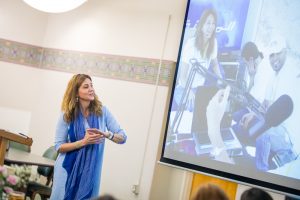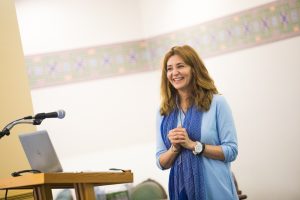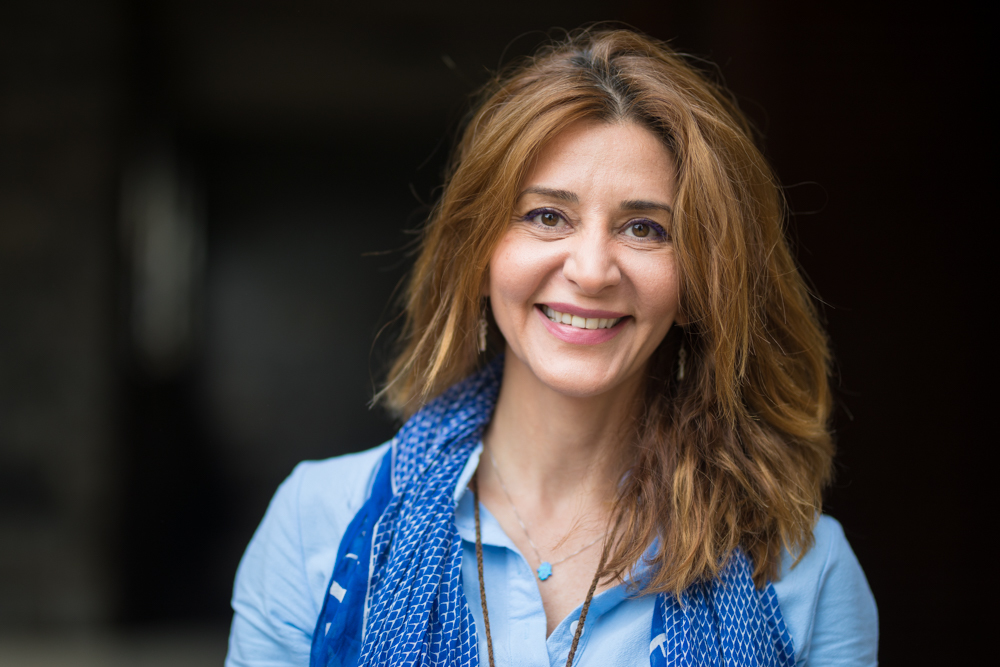“When art moves and media amplifies, it brings the heart and the mind together,” former “Good Morning Syria” radio host and Syrian expat Honey Al Sayed said during a visit to the Summer Peacebuilding Institute (SPI) at Eastern Mennonite University.
“We can’t be just rational, and we can’t be just emotional,” she said. “We need to be able to be both. That’s what helps shift narratives and perceptions.”
Al Sayed, who reached millions of listeners in over six years of hosting that ended in 2012 when she was forced into exile by the Syrian civil war, was the featured presenter at the third of four Horizons of Change lunches, an annual hallmark of SPI. During the first lunch, Tecla Namachanja Wanjala MA ’04 was honored as the Center for Justice and Peacebuilding’s Peacebuilder of the Year. The second lunch featured conflict resolution specialist and author Donna Hicks.

An associate fellow at the Geneva Center for Security Policy (GCSP), Al Sayed holds a master’s degree in international affairs from the Fletcher School of Law and Diplomacy at Tufts University. She has appeared at the United Nations General Assembly, the United Nations Foundation, GCSP, the United States National Press Club, the Foreign Service Institute and the United States Institute of Peace.
She is also the founder and CEO of Media and Arts for Peace (MAP), begun in 2018 following two years of collaborative research with GCSP. A creative consulting and talent agency serving artists from conflict zones and diaspora communities, MAP “not only introduces more efficient and effective ways of tackling global challenges, such as violence, but we also begin to shift the broader public narrative around these issues,” according to its website.
Prior to founding MAP, Al Sayed also co-founded Radio SouriaLi, an online radio station with more than 500,000 listeners in Syria and the diaspora. It began with four collaborators who were in exile in different countries, and now includes 27 people in 17 countries.
‘Like oxygen to fire’
Media and the arts are a “double-edged sword,” Al Sayed said in her SPI presentation. While they can be used destructively, they also play a constructive role that “paves the way to tolerance and empathy and inclusion.”
When media – which “to civil society is like oxygen to fire” – amplifies art, it creates “emotional, human connection,” she said. That happened with Warsan Shire’s visceral poem “Home,” which in 2015 gained wide exposure during the refugee crisis in Europe; it begins no one leaves home / unless home is the mouth of a shark.

“Changing people’s attitudes and shaping their behavior is at the core of peacebuilding, and it’s also at the core of media and the arts,” she said. “Peacebuilding scholars are increasingly recognizing that for sustainable peace to occur, it requires something beyond the rational, cognitive engagement that takes place.”
In her master’s research, Al Sayed studied conflicts in Afghanistan, Bosnia and Syria. She found that “media and the arts throughout history have actually flourished in conflict. That’s because it empowers people with information, it preserves culture, and it documents the first casualty of war – the truth – and with it humanitarian violations.”
As a “safe space” for self expression, Al Sayed said, media and the arts help people to “reimagine a better future” and help foster healing and communication.
The arts and media can also expose the irrationality of violence. Al Sayed displayed a photo of a Syrian street filled with fleeing people surrounded by bombed buildings, and said, “The source of violence in conflict does not spring solely from our rational, human thinking, our material physical world, our politics, our economy … because if you look at this, I don’t see anything rational about it.”
A fifth home
Al Sayed was born to Syrian parents who raised her in Kuwait. After being displaced by the Iraqi invasion of that country, she attended Cairo American College in Egypt. She earned an undergraduate degree from the Lebanese American University, and then moved to Syria.
There, hosting the three-hour live radio show “Good Morning Syria” was “the best job I’ve ever had,” Al Sayed said. It was also a platform that, she realized, came with a responsibility to push for social and cultural reform, “to work inside the system and try to create change bottom-top.”
Eventually, she was forced to leave. As she had previously traveled here to speak about her work and therefore had a visa, Al Sayed flew to the United States; she calls herself “a privileged refugee.” She became a political asylee, making the United States her “fifth home.”
She shares about her experiences in courses at the Georgetown University School of Foreign Service and GCSP and the U.S. Institute of Peace.
